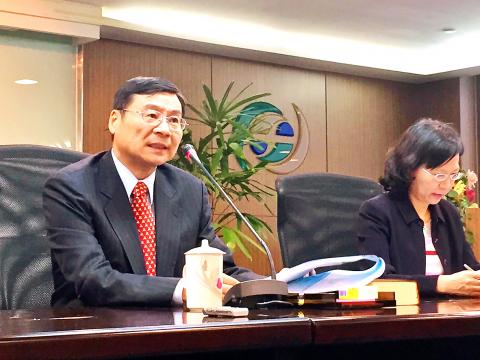In a bid to maintain market order and improve the financial industry’s quality, the Financial Supervisory Commission (FSC) is set to amend the Banking Act (銀行法) to add penalty provisions on domestic banks that launch price wars.
The move is part of a plan proposed by the commission yesterday to strengthen the nation’s financial infrastructure and raise the industry’s competitiveness.
“Under the fast-changing external environment, domestic financial institutions have to improve their conditions to further develop in Asia,” commission Chairman William Tseng (曾銘宗) told a news conference in Taipei.

Photo: Wang Menglun, Taipei Times
The commission’s plan has 12 initiatives, which include various expectations for local players and a few mandatory regulations.
One of the initiatives is to ask domestic financial institutions to set reasonable prices for their products and services to avoid a destructive competition in the market and to enhance their risk management capability, Tseng said.
After reviewing current laws and discussions with the Fair Trade Commission, the FSC found there are punitive provisions for insurance companies and brokerage houses, but not for banks, Tseng said.
As a result, the FSC said it decided to draft an amendment to the Banking Act and develop a clear standard to punish companies that have engaged in unreasonable price-cutting, he said.
Tseng also reiterated his commission’s plan to adjust some regulations to allow private financial institutions to buy their peers through public tenders.
However, it will only allow tender offers for the purpose of mergers and acquisitions (M&A), with an interested player having to promise to receive a 50 percent stake in the merged company.
The FSC will also consider provisions to protect small retail shareholders’ rights, the eligibility of the players, freedom from shareholding controversies and the transparent funding resources, Tseng added.
Tseng said he hoped local players would be able to expand thei capital and asset scale through M&A, which may effectively reduce the number of financial institutions in Taiwan and resolving the over-banking issue.
In the meantime, the government is targeting 15 percent in return on equity (ROE) and 1 percent in return on assets (ROA) averagely for the financial industry in the long term, as the effect driven by these initiatives, Tseng said.
Although the financial industry saw its profitability rise to a record-high level last year, the sector’s ROE and ROA averaged 11.65 percent and 0.79 percent, respectively, FSC data showed.

The US dollar was trading at NT$29.7 at 10am today on the Taipei Foreign Exchange, as the New Taiwan dollar gained NT$1.364 from the previous close last week. The NT dollar continued to rise today, after surging 3.07 percent on Friday. After opening at NT$30.91, the NT dollar gained more than NT$1 in just 15 minutes, briefly passing the NT$30 mark. Before the US Department of the Treasury's semi-annual currency report came out, expectations that the NT dollar would keep rising were already building. The NT dollar on Friday closed at NT$31.064, up by NT$0.953 — a 3.07 percent single-day gain. Today,

‘SHORT TERM’: The local currency would likely remain strong in the near term, driven by anticipated US trade pressure, capital inflows and expectations of a US Fed rate cut The US dollar is expected to fall below NT$30 in the near term, as traders anticipate increased pressure from Washington for Taiwan to allow the New Taiwan dollar to appreciate, Cathay United Bank (國泰世華銀行) chief economist Lin Chi-chao (林啟超) said. Following a sharp drop in the greenback against the NT dollar on Friday, Lin told the Central News Agency that the local currency is likely to remain strong in the short term, driven in part by market psychology surrounding anticipated US policy pressure. On Friday, the US dollar fell NT$0.953, or 3.07 percent, closing at NT$31.064 — its lowest level since Jan.

The New Taiwan dollar and Taiwanese stocks surged on signs that trade tensions between the world’s top two economies might start easing and as US tech earnings boosted the outlook of the nation’s semiconductor exports. The NT dollar strengthened as much as 3.8 percent versus the US dollar to 30.815, the biggest intraday gain since January 2011, closing at NT$31.064. The benchmark TAIEX jumped 2.73 percent to outperform the region’s equity gauges. Outlook for global trade improved after China said it is assessing possible trade talks with the US, providing a boost for the nation’s currency and shares. As the NT dollar

The Financial Supervisory Commission (FSC) yesterday met with some of the nation’s largest insurance companies as a skyrocketing New Taiwan dollar piles pressure on their hundreds of billions of dollars in US bond investments. The commission has asked some life insurance firms, among the biggest Asian holders of US debt, to discuss how the rapidly strengthening NT dollar has impacted their operations, people familiar with the matter said. The meeting took place as the NT dollar jumped as much as 5 percent yesterday, its biggest intraday gain in more than three decades. The local currency surged as exporters rushed to